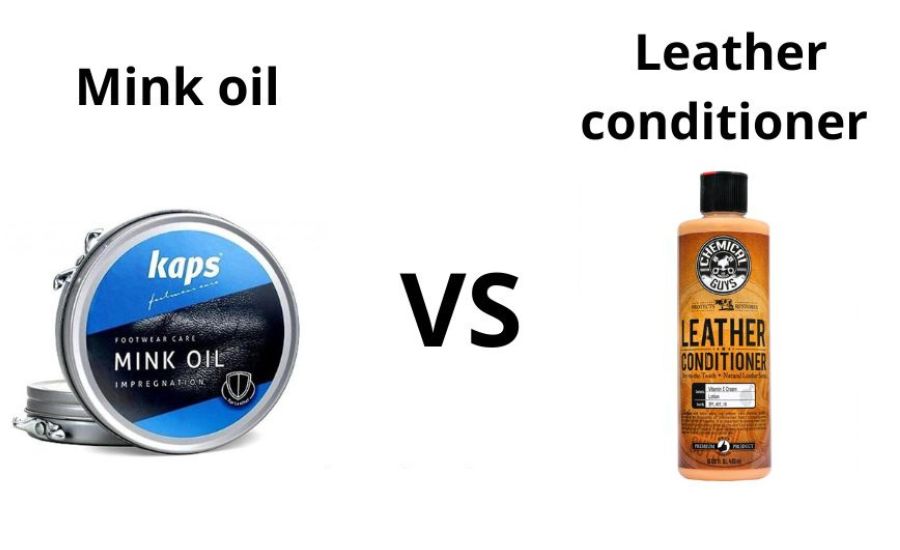Which the best mink oil vs. leather conditioner? Leather, durable but nevertheless requires proper care to maintain their quality and longevity. Although we don’t encourage buying new leather goods as they are made of animal skin, they may be obtained from thrift stores or remain from relatives.
When it comes to preserving leather, two prominent options often considered are mink oil and leather conditioner, each offering unique characteristics in protecting leather.
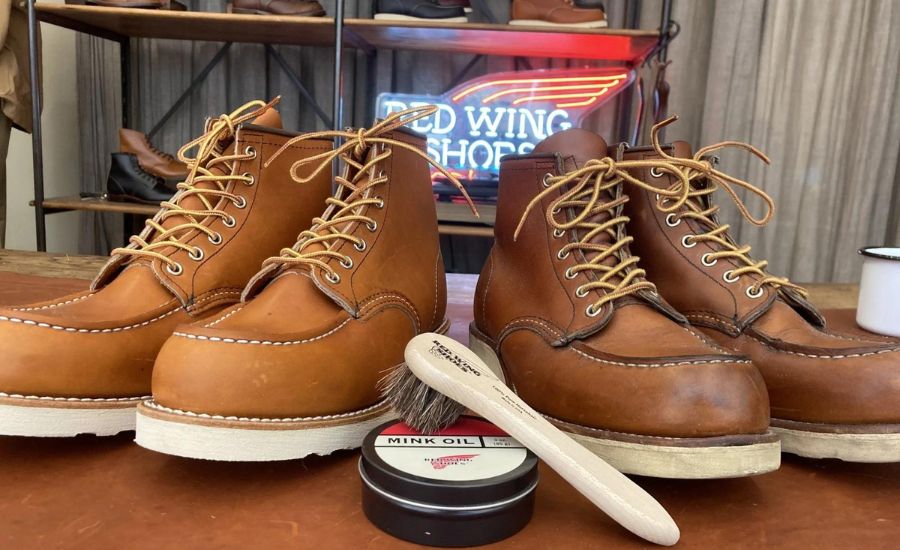
Contents
- 1 Understanding mink oil
- 2 Exploring leather conditioners
- 3 Key differences between mink oil vs. leather conditioner
- 4 Conclusion
- 5 FAQ
Understanding mink oil
The fatty layer beneath mink skins is the source of mink oil, which is frequently acquired as a byproduct of the fur trade.
The method used to extract it creates ethical questions because animals are treated in order to obtain a mink pelt.
Texture and consistency: mink oil has significant application qualities and is usually semi-viscous at room temperature.
Benefits of using mink oil
Water resistance: mink oil works as a barrier to keep moisture off of leather surfaces, just like any other oil does.
Disadvantages of mink oil
- Mink oil production is tied to the fur industry, which involves practices deemed cruel and unethical by many.
- The ethical concerns of mink oil extend beyond animal welfare; mink oil production processes may have adverse environmental effects due to intensive farming practices.
- Mink oil has the potential to turn rancid over time if improperly stored or exposed to air and light. This may result in an unpleasant smell and reduce the product’s ability to soften leather, either damaging the material or changing its characteristics.
- Mink oil may darken or change the color of certain types of leather as mink oil makes it hard for leather to absorb. This alteration in color might not be desirable for specific products or could lead to uneven shading across the surface, affecting the overall aesthetic appeal.
- Excessive or incorrect usage of mink oil can lead to residue accumulation, which can change the texture and look of the leather.
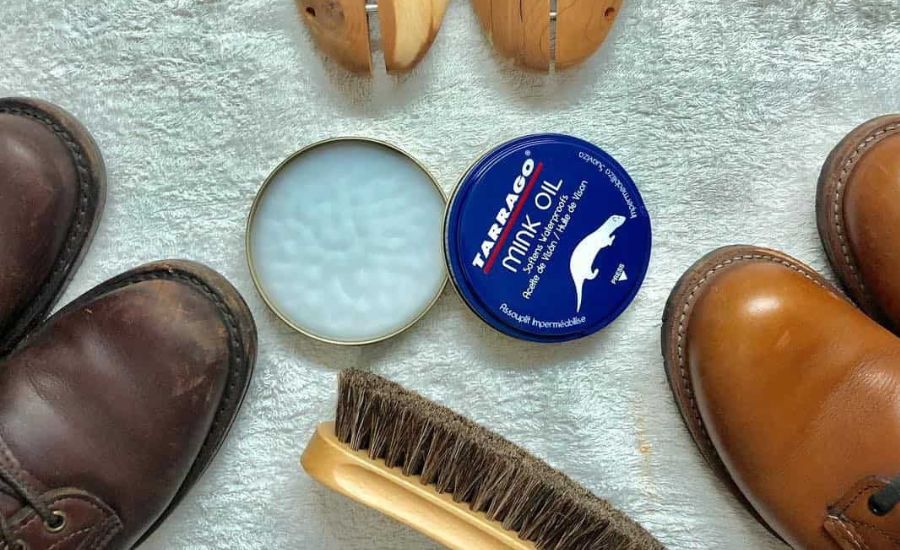
Exploring leather conditioners
Leather conditioners encompass a range of products designed to nourish, protect, and enhance the quality of leather items.
Conditioning agents: natural oils (such as neatsfoot oil, lanolin, or beeswax) and synthetic compounds are frequently used in leather conditioners. These substances seep into the leather fibers to replenish moisture and suppleness, making leather soft.
The product penetrates the leather more easily and keeps it from drying out thanks to the synthetic elements.
Protectants: natural oils and other ingredients form a shield layer in the leather fibers, protecting the material from environmental elements like moisture and UV radiation. This is why leather conditioners provide superior protection.
Advantages and disadvantages of using leather conditioners
Pros
- Regular conditioning with the right products keeps leather from drying out, which lowers the likelihood of cracks and lengthens the life of leather.
- Over time, the conditioner keeps the leather flexible and prevents it from becoming stiff or splitting by providing it with deep moisture and nourishment.
- Leather conditioners are formulated to accommodate various leather finishes, including colored, semi-aniline, and aniline leather, which makes them adaptable for a variety of leather products.
Cons
- If used excessively, some leather conditioners, particularly oil-based ones, may somewhat darken or alter the appearance of some types of leather. You may test them on a limited, discrete area before broad implementation.
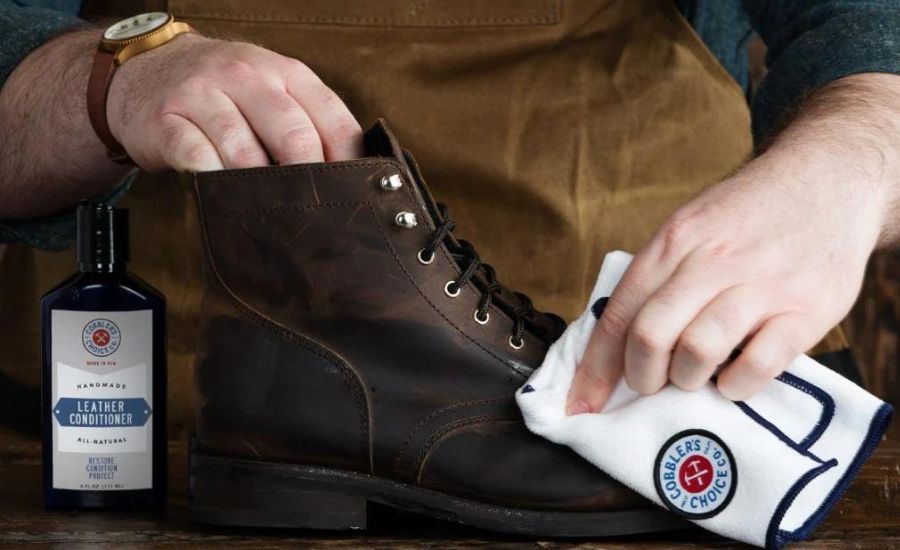
Key differences between mink oil vs. leather conditioner
Understanding the distinctions between mink oil and leather conditioner unveils crucial factors guiding the choice of preserving and maintaining leather.
Application methods
Understanding the distinct application methods plays a pivotal role in preserving the integrity and longevity of leather.
Mink oil
When you apply mink oil, it is typically done using a cloth or sponge. When you use mink oil, this method allows it to penetrate the leather’s surface, ensuring deep nourishment and softening. Users often apply mink oil onto the cloth or sponge and gently rub it onto the entire boot, baseball gloves, or other items in circular motions.
It’s crucial to allow the material to absorb the mink oil for an adequate period before wiping off any excess oil with a clean cloth with a leather cleaner.
Conditioner
Leather conditioners, available in various forms such as creams, lotions, or sprays, offer flexibility in application. Similar to mink oil, they are applied using a cloth, sponge, or sometimes directly sprayed onto the surface. Some of them require buffing or wiping off excess residue after you apply leather conditioners to avoid any buildup.
Effects on different leather types
The impact of mink oil and leather conditioner differs based on the specific type of leather being treated.
Full-grain leather
Mink oil: offers deep conditioning and water resistance, suitable for this type of leather like leather shoes. However, mink oil might darken the material or alter its appearance.
Leather conditioner: provides nourishment and protection without significantly changing the appearance, making it suitable for maintaining the natural look of leather shoes.
Suede leather
Mink oil: mink oil may not be ideal for suede leather due to potential discoloration or texture changes.
Leather conditioner: formulations designed specifically for suede can help maintain its softness and texture without causing damage.
Aniline leather
Mink oil: mink oil might alter the appearance due to potential darkening. Mink oil is not typically recommended for aniline leather.
Leather conditioner: specialized conditioners designed for aniline leather can offer nourishment and protection without compromising its natural beauty.
Pigmented/protected leather
Mink oil: mink oil may provide conditioning but could alter the appearance of pigmented or protected leather.
Leather conditioner: offers suitable maintenance without significantly changing the appearance, ensuring protection and flexibility.
Exotic or delicate leather
Mink oil: mink oil is not recommended due to potential alterations in appearance or texture.
Leather conditioner: specialized conditioners formulated for delicate or exotic leathers offer gentle care without compromising their unique characteristics.
Long-term impact on leather
Understanding the long-term impact of various leather maintenance products is crucial for maintaining the durability, appearance, and overall quality of leather goods over time.
Mink oil
Benefits: the conditioning properties of mink oil can contribute to the long-term flexibility and durability of leather.
Considerations: however, over time, mink oil might attract dust and dirt due to its natural composition. This buildup of mink oil, if not regularly cleaned, could affect the leather’s appearance and texture, requiring more frequent cleaning and reapplication.
Additionally, mink oil can’t provide the glossy shine that conditioners can.
Leather conditioner
Benefits: leather conditioners, when used as recommended, offer lasting protection and nourishment without necessarily attracting residue. They aid in preventing drying out, cracking, and stiffness in leather over time, contributing to its longevity.
Considerations: regular, moderate application according to manufacturer guidelines helps avoid any adverse long-term impacts.
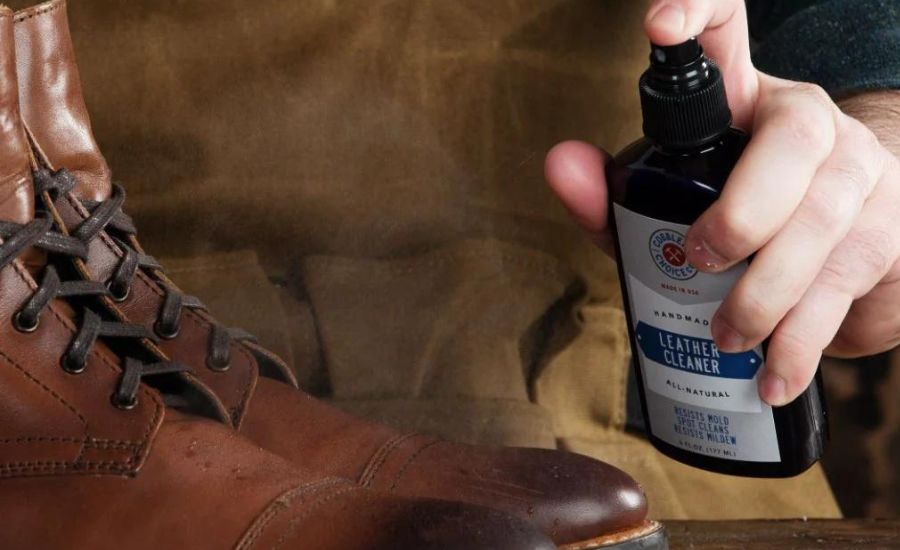
Suitability for specific uses or conditions
Selecting the right leather care product often hinges upon its suitability for specific uses or conditions.
Mink oil
Outdoor gear and footwear: the water-resistant properties of mink oil make it particularly suitable for conditioning and protecting outdoor gear.
Thicker or rugged leathers: due to its ability to deeply penetrate leather fibers, mink oil is often preferred for thicker or more rugged leather that requires increased water resistance and conditioning.
Conditioner
Versatility across leather types: leather conditioners offer a broader suitability across various leather types, including more delicate or lighter-colored leathers. They provide nourishment, flexibility, and protection without significantly altering the appearance of different leather finishes.
General leather maintenance: leather conditioners are suitable for everyday use on various products, including furniture, jackets, bags, and accessories, contributing to their maintenance and longevity.
Ethics and environmental impact
Addressing the ethics and environmental impact associated with leather maintenance products like mink oil and leather conditioners is fundamental in today’s conscientious consumer landscape.
Mink oil
Ethical concerns: mink oil extraction is tied to ethical considerations due to its origin in the fur industry. The practices associated with obtaining mink oil often raise concerns regarding animal welfare and ethical treatment.
Environmental impact: the production of mink oil might have environmental implications due to its association with the fur industry, potentially contributing to concerns related to resource consumption, waste generation, and ecological sustainability.
Conditioner
Ethical considerations: leather conditioners, especially those containing synthetic or plant-based ingredients, might align better with ethical choices for individuals concerned about animal welfare. But the sourcing and manufacturing processes of these products could still raise ethical concerns related to sustainability or labor practices.
Environmental impact: while some leather conditioners may have a lower environmental impact than mink oil due to their formulation, they might still involve manufacturing processes that contribute to resource consumption, emissions, or waste generation.
Note: understanding these differences aids in selecting the appropriate product based on specific leather needs, ethical considerations, and desired long-term effects on leather items.
The choice between mink oil and leather conditioner goes beyond their performance on leather.
We should opt for conditioners with plant-based or synthetic ingredients, considering their values and efforts towards sustainability in their purchasing decisions. It’s essential to research and choose products from companies with transparent and responsible practices to minimize adverse impacts.
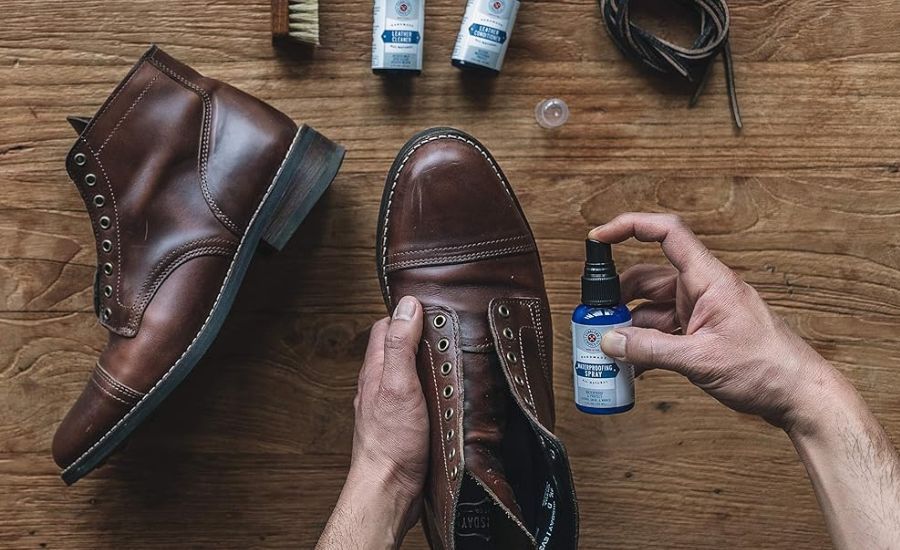
Conclusion
Leather conditioner presents several advantages over mink oil for comprehensive leather maintenance. Firstly, conditioners with synthetic or plant-based elements align better with conscientious environmental and animal welfare concerns.
Additionally, it offers versatility, catering to various leather types, including delicate and smooth leather, without significantly altering their appearance, unlike mink oil, which may darken or change the color of certain leathers.
Lastly, leather conditioners often provide more balanced nourishment, protection against cracking, and flexibility maintenance, while minimizing the risk of residue buildup, a potential issue commonly associated with mink oil.
FAQ
Should I use mink oil or leather conditioner?
It is not recommended to use mink oil. Conditioner suits varied leather, while mink oil might darken some and is extremely unethical.
What is the best oil to condition leather?
Different natural oils like jojoba oil, olive oil, or coconut oil can do it effectively.
What can I use instead of mink oil?
Alternatives include leather conditioners with synthetic or plant-based ingredients (like olive oil). Also, refrain from using baby wipes for cleaning or softening leather, as they can damage leather.
Does leather conditioner darken leather?
Some natural oils may slightly darken the material, but it varies based on the product and leather type.
Is mink oil good for leather?
No, you should not use mink oil on any leather goods. Your couch or other leather item will get more rigid with time if you use mink oil.
How to take care of leather boots?
Caring for leather boots involves several steps:
1. Use a damp cloth or specialized cleaner for leather boots.
2. Apply a suitable leather conditioner to your leather boots.
3. Store leather boots in a cool, dry place away from direct sunlight.
4. Use a high-quality shoe polish or cream on leather boots.
5. Keep leather boots away from extreme heat or cold.
6. Rotate between multiple pairs of leather boots, if you have them.
Regular care and maintenance can help preserve the durability of leather boots.

